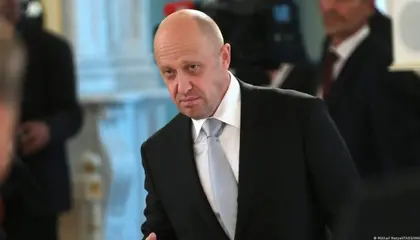The head of the mercenary group Wagner has described video sharing platform YouTube as the “information plague of our time,” adding that the only reason it hasn’t been banned in Russia is because of “traitors” in the Kremlin.
JOIN US ON TELEGRAM
Follow our coverage of the war on the @Kyivpost_official.
In a post on Telegram on Jan.18, Yevgeny Prigozhin said 40 percent of videos posted on the platform were “politicized and directed against Russia.” He did not provide evidence to back up the figure.
He went on to claim that a “huge number” of people in the Russian government “think only about one thing – if only Russia lost the war as soon as possible, if only the Americans would come and regulate us as soon as possible.”
He added: “Those who are against the closure of YouTube are, in my opinion, traitors to their people and their country; traitors to previous and future generations of Russians.
“They live abroad, take holidays abroad, raise children abroad, proclaim high values but, nevertheless, support the West in every possible way and feed on it.”
Prigozhin said he was confident that YouTube would be banned soon in Russia and those who actively use it “will be identified and punished as they deserve.”
His outburst is the latest instalment of an ongoing and ever-escalating spat between the Wagner group and the Kremlin. Prigozhin has criticized Russia's regular army in Ukraine in the wake of several setbacks on the ground in recent months, and has suggested his group has not been given proper recognition.

North Korea’s Ballistic Missile with 1,200–3,000 km Range Spotted in Russia
At the end of October, Prigozhin appealed to the Prosecutor General's Office with a request to block YouTube, as well as to declare the activities of its owner Google “undesirable.”
He claimed at the time that the video hosting platform is “flooded with fakes aimed at discrediting the Russian military.”
Gazprom-Media CEO Alexander Zharov, in an interview with RBC on Jan. 18, expressed the opinion that “if the platform continues to engage in systematic and deliberate violation of Russian legislation,” the issue of blocking should be considered.
Prigozhin’s claims that YouTube is the “information plague of our time” will raise more than a few eyebrows given both his and the Kremlin’s role in spreading disinformation on a global scale for years.
Examples include:
· Prigozhin himself recently admitted meddling in the U.S. presidential election in 2016;
· Russia claimed it’s full-scale invasion of Ukraine was simply a defensive measure against the aggression of NATO. Putin later admitted it was an imperialistic land grab;
· Russia has been forced to make up a stream of excuses as to why the on-going invasion – which it had hoped would only take a matter of days – was dragging on for months and inflicting a series of humiliating defeats on the Kremlin;
· Russia continues to falsely deny involvement in a number of major events including the downing of MH17, the poisoning of Sergei Skripal and the assassination of Alexander Litvinenko.
Russia completely controls the information space within the country and also promotes its narratives, manipulates facts, and tries to distract attention from its crimes abroad.
Its methods of spreading disinformation vary, but the main platforms are TV, internet media and social networks. Sometimes it even resorts to rewriting Wikipedia articles.
You can also highlight the text and press Ctrl + Enter






